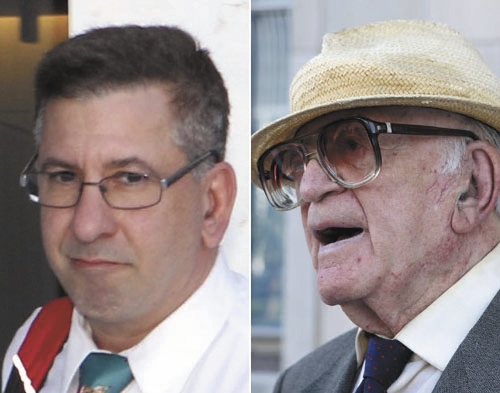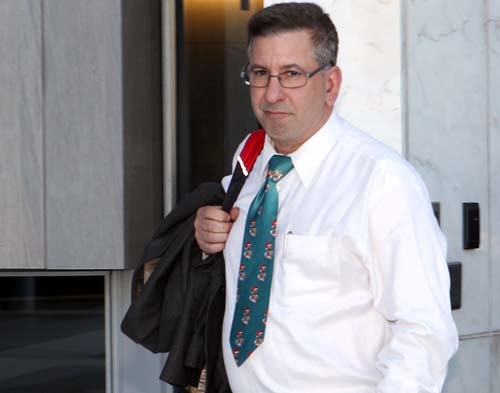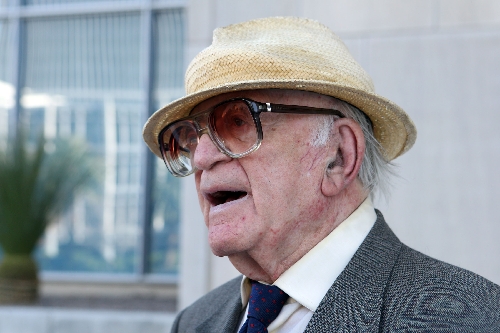Henderson pediatrician, researcher guilty of fraud in stem cell case
A federal jury Wednesday convicted a Henderson pediatrician and a longtime medical researcher of defrauding chronically ill patients through an experimental stem cell implant procedure.
Ralph Conti, 51, who has been practicing medicine locally since 1990, and Alfred Sapse, 86, a Romanian-educated physician not licensed in the United States, faced conspiracy and fraud charges.
The jury reached a verdict shortly before noon after several hours of deliberation following a trial that stretched over four weeks in the courtroom of Senior U.S. District Judge Kent Dawson.
Conti and Sapse showed no emotion as the court clerk read the verdict.
Dawson allowed both men to remain free pending their Feb. 27 sentencing.
The procedure involved surgically implanting placental tissue in the abdomens of ailing patients. The theory behind the implant was to allow stem cells in the tissue to migrate to damaged areas of the body and repair them.
The defendants were convicted of one count of conspiracy to commit mail fraud and wire fraud, which draws a maximum five years in prison.
Conti also was found guilty of two counts of mail fraud and two counts of wire fraud. Sapse was convicted of an additional seven counts of mail fraud and 11 counts of wire fraud.
They face up to 20 years in prison and maximum fines of $250,000 on each of the fraud counts.
Afterward, First Assistant U.S. Attorney Steven Myhre and Assistant U.S. Attorney Crane Pomerantz, who prosecuted the case, declined comment.
But U.S. Attorney Daniel Bogden issued a statement praising the verdict.
"Persons who commit health care fraud on individuals and the health care system will be vigorously prosecuted by the U.S. Attorney's Office for Nevada," Bogden said. "These defendants allowed greed rather than compassion to control their actions, and they must now suffer the consequences and penalty."
Antoinette Henry, with the US. Food and Drug Administration's office of criminal investigations, said: "The Food and Drug Administration will never turn its back on patients who are victimized twice, first by fate and then by predators who prey on these vulnerable victims."
Conti declined comment coming out of the courtroom, but his Oakland, Calif., lawyer, Dennis Roberts, called the verdict an "absolute miscarriage of justice" and said he would appeal.
Las Vegas attorney Daniel Albregts, who represents Sapse, said he was "disappointed" in the verdict and also planned an appeal.
Sapse added, "I'm destroyed. The last word has not been said. You should expect some surprises."
He said the protracted criminal proceedings against him were part of a campaign by the government to prevent him from developing a drug to treat Alzheimer's disease.
Earlier this week, while testifying in his own defense, Sapse took credit for developing the anti-aging drug Gerovital and getting it legalized in Nevada in the 1970s when Food and Drug Administration officials wouldn't approve it.
Sapse also testified that a federal raid at his Las Vegas apartment during the stem cell investigation traumatized his bedridden, 88-year-old wife and led to her death in 2009.
After his July 2010 arrest, authorities accused Sapse of duping patients into undergoing the stem cell implant. Conti was charged months later.
Sapse paid Conti $60,000 in 2006 to perform the procedure on 30 patients with serious illnesses, including multiple sclerosis and cerebral palsy, knowing the procedure wouldn't work, prosecutors alleged.
During the trial, prosecutors alleged that Sapse gambled away a large share of the $1 million he earned in the implant scheme.
Both Conti and Sapse testified that the procedure resulted in dramatic improvements in several ailing patients who received implants. Most of the patients weren't from Nevada; one came from South Africa.
But prosecutors in closing arguments this week called the defendants' claims about the procedure a ruse that took money from the ailing patients and dashed their dreams of a better life.
Sapse ran the scheme out of his apartment and did no research or testing before getting Conti to practice on patients, prosecutors argued.
Prosecutors said some of the implanted tissue was taken from placentas cleaned with a mixture of hydrogen peroxide and water in the kitchen sink of a midwife and stored in her refrigerator.
Prosecutors believe the cleaning process actually killed the tissue before it was implanted.
Prosecutors said the defendants had no idea who donated the placentas and whether they came from mothers with any infectious diseases.
Defense lawyers argued that Conti and Sapse were motivated by compassion, not greed, and that all of the patients knew beforehand that the procedure was experimental.
Contact Jeff German at jgerman@reviewjournal.com or 702-380-8135.




















